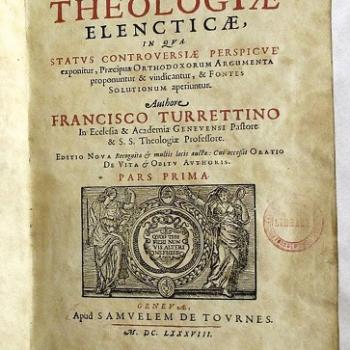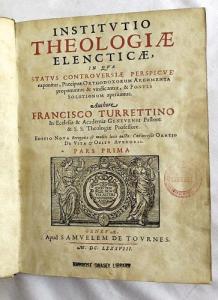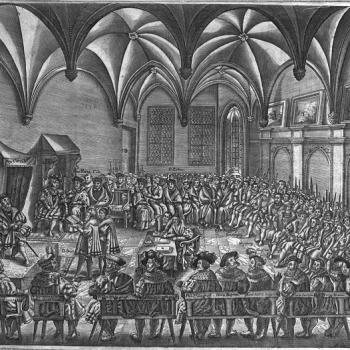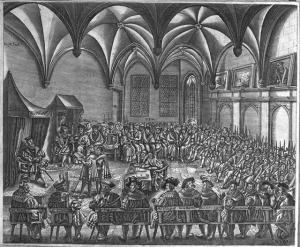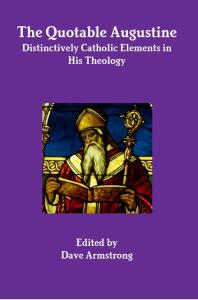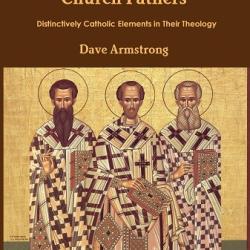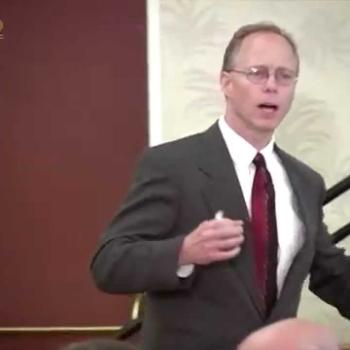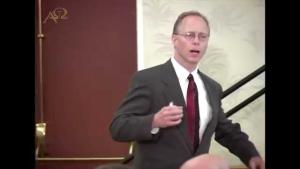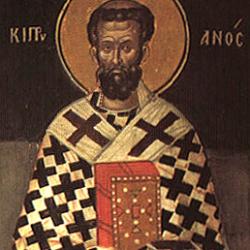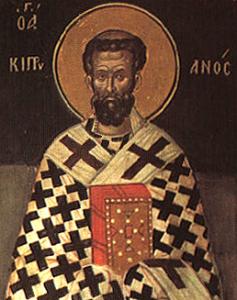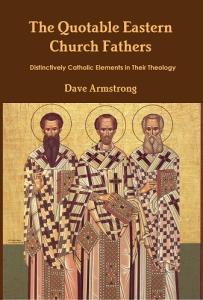
“Please Hit ‘Subscribe’”! If you have received benefit from this or any of my other 4,500+ articles, please follow this blog by signing up (w your email address) on the sidebar to the right (you may have to scroll down a bit), above where there is an icon bar, “Sign Me Up!”: to receive notice when I post a new blog article. This is the equivalent of subscribing to a YouTube channel. Please also consider following me on Twitter / X and purchasing one or more of my 55 books. All of this helps me get more exposure, and (however little!) more income for my full-time apologetics work. Thanks so much and happy reading!
***
[relevant sections from my book, The Quotable Eastern Church Fathers: Distinctively Catholic Elements in Their Theology (July 2013, 303 pages). To verify sources (standard Schaff edition of the Fathers), see the St. John Chrysostom section on the New Advent web page, “The Fathers of the Church”]
***
Baptism and Being “Born Again”
And for what reason, says one, if the laver take away all our sins, is it called, not a laver of remission of sins, nor a laver of cleansing, but a laver of regeneration? Because it does not simply take away our sins, nor simply cleanse us from our faults, but so as if we were born again. (Instructions to Catechumens, First, 3; NPNF1-9)
Baptism and Justification / Sanctification
Hear therefore what follows: “And such were some of you, but ye were washed, but ye were sanctified, but ye were justified in the name of the Lord Jesus Christ, and in the spirit of our God.” We promise to show you that they who approach the laver become clean from all fornication: but the word has shown more, that they have become not only clean, but both holy and just, for it does not say only “ye were washed,” but also “ye were sanctified and were justified.” What could be more strange than this, when without toil, and exertion, and good works, righteousness is produced? For such is the lovingkindness of the Divine gift that it makes men just without this exertion. (Instructions to Catechumens, First, 3; NPNF1-9)
Ver. 30. “Moreover whom He did predestinate, them He also called; and whom He called, them He also justified.” Now He justified them by the regeneration of the laver. “And whom He justified, them He also glorified” by the gift, by the adoption. (Homily XV on Romans 8:28: v. 8:30; NPNF1-11)
For, writing to the Corinthians, he says, “But ye were washed, but ye were sanctified, but ye were justified in the name of the Lord Jesus Christ, and in the Spirit of our God.” (1 Cor. vi. 11.) What then, tell me? were these not baptized into the Father? Then assuredly they were neither washed nor sanctified. (Homily XXX on 2 Corinthians 13:10, 3, v. 13:14; NPNF1-12)
. . . when we had committed many and grievous sins, and had not ceased from youth to extreme old age to defile our souls with ten thousand evil deeds, for none of these sins did He demand from us a reckoning, but granted us remission of them by the washing of Regeneration, and freely gave us Righteousness and Sanctification. (Homily XXVIII on John, v. 3:17; NPNF1-14)
Baptism and Salvation
We have the sum and substance of the good things: through baptism we received remission of sins, sanctification, participation of the Spirit, adoption, eternal life. (Homily XL on Acts 18:18; NPNF1-11)
Yea, again I say, great indeed is Baptism, and without baptism it is impossible to obtain the kingdom. . . . It is impossible to be saved without it, . . . (Homily III on 1 Corinthians 1:10, 6; v. 1:14, 17; NPNF1-12)
Baptismal Regeneration
These verily are they who are entrusted with the pangs of spiritual travail and the birth which comes through baptism: by their means we put on Christ, and are buried with the Son of God, and become members of that blessed Head. . . . the others [priests] are the authors of our birth from God, even that blessed regeneration which is the true freedom and the sonship according to grace. . . . our priests have received authority to deal, not with bodily leprosy, but spiritual uncleanness—not to pronounce it removed after examination, but actually and absolutely to take it away. (Treatise Concerning the Christian Priesthood, Book III, 6; NPNF1-9)
. . . I see that our discourse now constrains us to something more necessary to say what baptism is, and for what reason it enters into our life, and what good things it conveys to us. But, if you will, let us discourse about the name which this mystic cleansing bears: for its name is not one, but very many and various. For this purification is called the laver of regeneration. “He saved us,” he saith, “through the laver of regeneration, and renewing of the Holy Ghost.” It is called also illumination, and this St. Paul again has called it, “For call to remembrance the former days in which after ye were illuminated ye endured a great conflict of sufferings;” and again, “For it is impossible for those who were once illuminated, and have tasted of the heavenly gift, and then fell away, to renew them again unto repentance.” It is called also, baptism: “For as many of you as were baptized into Christ did put on Christ.” (Instructions to Catechumens, First, 2; NPNF1-9)
For it creates and fashions us anew not forming us again out of earth, but creating us out of another element, namely, of the nature of water. For it does not simply wipe the vessel clean, but entirely remoulds it again. For that which is wiped clean, even if it be cleaned with care, has traces of its former condition, and bears the remains of its defilement, but that which falls into the new mould, and is renewed by means of the flames, laying aside all uncleanness, comes forth from the furnace, and sends forth the same brilliancy with things newly formed. (Instructions to Catechumens, First, 3; NPNF1-9)
And consider: a man has gotten grievous sins by committing murder or adultery, or some other crime: these were remitted through Baptism. For there is no sin, no impiety, which does not yield and give place to this gift; for the Grace is Divine. (Homily I on Acts 1:1-2; NPNF1-11)
For if they were full of the Spirit, it was of that which is from the Laver of Baptism. (Homily XV on Acts 6:8; NPNF1-11)
And in another sense, too, a mystery is so called; because we do not behold the things which we see, but some things we see and others we believe. For such is the nature of our Mysteries. I, for instance, feel differently upon these subjects from an unbeliever. . . . He hearing of a laver, counts it merely as water: but I behold not simply the thing which is seen, but the purification of the soul which is by the Spirit. He considers only that my body hath been washed; but I have believed that the soul also hath become both pure and holy; and I count it the sepulchre, the resurrection, the sanctification, the righteousness, the redemption, the adoption, the inheritance, the kingdom of heaven, the plenary effusion of the Spirit. (Homily VII on 1 Corinthians 2:6-7, 2; NPNF1-12)
In Baptism are fulfilled the pledges of our covenant with God; burial and death, resurrection and life; and these take place all at once. For when we immerse our heads in the water, the old man is buried as in a tomb below, and wholly sunk forever; then as we raise them again, the new man rises in its stead. (Homily XXV on John, v. 3:5; NPNF1-14)
. . . He freely gave to them by Baptism entire remission of their sins. (Homily XXVII on John, v. 3:14; NPNF1-14)
Eucharist and Salvation
. . . what shall we say of the Body of Him Who is God over all, spotless, pure, associate with the Divine Nature, the Body whereby we are, and live; whereby the gates of hell were broken down and the sanctuaries of heaven opened? how shall we receive this with so great insolence? Let us not, I pray you, let us not slay ourselves by our irreverence, but with all awfulness and purity draw nigh to It; and when thou seest It set before thee, say thou to thyself, “Because of this Body am I no longer earth and ashes, no longer a prisoner, but free: because of this I hope for heaven, and to receive the good things therein, immortal life, the portion of angels, converse with Christ; this Body, nailed and scourged, was more than death could stand against; this Body the very sun saw sacrificed, and turned aside his beams; for this both the veil was rent in that moment, and rocks were burst asunder, and all the earth was shaken. This is even that Body, the blood-stained, the pierced, and that out of which gushed the saving fountains, the one of blood, the other of water, for all the world.” . . . But these things I say, not to keep us from approaching, but to keep us from approaching without consideration. For as the approaching at random is dangerous, so the not communicating in those mystical suppers is famine and death. For this Table is the sinews of our soul, the bond of our mind, the foundation of our confidence, our hope, our salvation, our light, our life. When with this sacrifice we depart into the outer world, with much confidence we shall tread the sacred threshold, fenced round on every side as with a kind of golden armor. (Homily XXIV on 1 Corinthians 10:13, 7-8, v. 10:23-24; NPNF1-12)
Parents often entrust their offspring to others to feed; “but I,” saith He, “do not so, I feed you with Mine own flesh, desiring that you all be nobly born, and holding forth to you good hopes for the future. For He who giveth out Himself to you here, much more will do so hereafter. I have willed to become your Brother, for your sake I shared in flesh and blood, and in turn I give out to you the flesh and the blood by which I became your kinsman.” This blood causeth the image of our King to be fresh within us, produceth beauty unspeakable, permitteth not the nobleness of our souls to waste away, watering it continually, and nourishing it. . . . [it] watereth our souls, and worketh in them some mighty power. This blood, if rightly taken, driveth away devils, and keepeth them afar off from us, while it calleth to us Angels and the Lord of Angels. For wherever they see the Lord’s blood, devils flee, and Angels run together. . . . This blood is the salvation of our souls, by this the soul is washed, by this is beautiful, by this is inflamed, this causeth our understanding to be more bright than fire, and our soul more beaming than gold; this blood was poured forth, and made heaven accessible. . . . Christ hath purchased us with His blood, and adorned us with His blood. They who share this blood stand with Angels and Archangels and the Powers that are above, clothed in Christ’s own kingly robe, and having the armor of the Spirit. . . . Now as this is a great and wonderful thing, so if thou approach it with pureness, thou approachest for salvation; but if with an evil conscience, for punishment and vengeance. “For,” It saith, “he that eateth and drinketh unworthily” of the Lord, “eateth and drinketh judgment to himself” ( 1 Cor. xi. 29 ); since if they who defile the kingly purple are punished equally with those who rend it, it is not unreasonable that they who receive the Body with unclean thoughts should suffer the same punishment as those who rent it with the nails. (Homily XLVI on John, v. 6:52; NPNF1-14)
How it is so, hear. “Verily I say unto you, Except a man eat My flesh, and drink My blood, he hath not eternal life in him.” Since the Jews had before asserted that this was impossible, He showeth not only that it is not impossible, but that it is absolutely necessary. Wherefore He addeth, “He that eateth My flesh and drinketh My blood, hath eternal life.” ( Homily XLVII on John, v. 6:53-54; NPNF1-14)
“As the Father liveth, so I live, and he that eateth Me shall live by Me.” And the “life” of which He speaketh is not life merely, but the excellent life; for that He spake not simply of life, but of that glorious and ineffable life, is clear from this. For all men “live,” even unbelievers, and uninitiated, who eat not of that flesh. Seest thou that the words relate not to this life, but to that other? And what He saith is of this kind: “He that eateth My flesh, when he dieth shall not perish nor suffer punishment”; He spake not of the general resurrection, (for all alike rise again,) but concerning the special, the glorious Resurrection, that which hath a reward. (Homily XLVII on John, v. 6:57; NPNF1-14)
Faith Alone (Falsity of) / Antinomianism
This is why they are called martyrs, because when bidden to abjure (the faith), they endure all things, that they may speak the truth: and we, when we are bidden by our passions to abjure, let us not be overcome. Gold saith: Say that Christ is not Christ. Then listen not to it as to God, but despise its biddings. The evil lusts “profess that they know God, but in works they deny Him.” (Tit. i. 16.) For this is not to witness, but the contrary. And indeed that others should deny (Him) is nothing wonderful: but that we who have been called to bear witness should deny Him, is a grievous and a heinous thing: this of all things does the greatest hurt to our cause. “It shall be to (your)selves for a testimony.” (Luke xxi. 13), He saith: but (this is) when we ourselves stand to it firmly. If we would all bear witness to Christ, we should quickly persuade the greater number of the heathen. It is a great thing, my beloved, the life (one leads). . . . Wilt thou learn what a brilliancy there is in a good life, what a force of persuasion it has? . . . This has brought slanders on the awful articles of our creed, this has turned everything upside down, that no one takes any account of good living: this is a mischief to the faith. . . . The badness of the life is a mischief to the doctrine of the Resurrection, to that of the immortality of the soul, to that of the Judgment: many other (false doctrines) too it draws on with itself, fate, necessity, denial of a Providence. . . . This is why the devil has brought in the doctrine of Fate: this is why he has said that the world is without a Providence . . . (Homily XLVII on Acts 21:39-49; NPNF1-11)
Ver. 7. “To them who by patient continuance in well doing seek for glory and honor and immortality, eternal life.” Here also he awakens those who had drawn back during the trials, and shows that it is not right to trust in faith only. For it is deeds also into which that tribunal will enquire. (Homily V on Romans 1:28: v. 2:7; NPNF1-11)
For “each of us shall give account of himself to God.” In order therefore that we may render up this account with a good defence, let us well order our own lives and stretch out a liberal hand to the needy, knowing that this only is our defence, the showing ourselves to have rightly done the things commanded; there is no other whatever. And if we be able to produce this, we shall escape those intolerable pains of hell, and obtain the good things to come; unto which may we all attain, by the grace and mercy of our Lord Jesus Christ . . . (Homily XXI on 1 Corinthians 9:1, 11, v. 9:12; NPNF1-12)
And let us make a little chest for the poor at home; and near the place at which you stand praying, there let it be put: and as often as you enter in to pray, first deposit your alms, and then send up your prayer; and as you would not wish to pray with unwashen hands, so neither do so without alms: since not even the Gospel hanging by our bed is more important than that alms should be laid up for you; for if you hang up the Gospel and do nothing, it will do you no such great good. (Homily XLIII on 1 Corinthians 16:1, 7, v. 16:9; NPNF1-12)
. . . not through believing only cometh your salvation, but also through the suffering and enduring the same things with us. (Homily II on 2 Corinthians 1:6-7, 1; NPNF1-12)
“And a virtuous mode of life,” for the doctrines need a mode of life . . . Attend to this, ye who come to baptism at the close of life, for we indeed pray that after baptism ye may have also this deportment, but thou art seeking and doing thy utmost to depart without it. For, what though thou be justified: yet is it of faith only. But we pray that thou shouldest have as well the confidence that cometh of good works. (Homily II on 2 Corinthians 1:6-7, 8, v. 1:10-11; NPNF1-12)
For to believe is not all that is required, but also to abide in love. (Commentary on Galatians, v. 5:6; NPNF1-13)
We have believed. This is a beginning; . . . we show our faith by our works . . . Let not the hearing, however, make us too much at our ease; for although He doth it for His own sake, yet notwithstanding He requires a duty on our part. If He says, “Them that honor Me I will honor, and they that despise Me shall be lightly esteemed,” (1 Sam. ii. 30.) let us reflect that there is that which He requires of us also. (Homily II on Ephesians, v. 1:14; NPNF1-13)
“It is the gift,” said he, “of God,” it is “not of works.” Was faith then, you will say, enough to save us? No; but God, saith he, hath required this, lest He should save us, barren and without work at all. His expression is, that faith saveth, but it is because God so willeth, that faith saveth. Since, how, tell me, doth faith save, without works? This itself is the gift of God. . . . He did not reject us as having works, but as abandoned of works He hath saved us by grace; so that no man henceforth may have whereof to boast. And then, lest when thou hearest that the whole work is accomplished not of works but by faith, thou shouldest become idle, observe how he continues, Ver. 10. “For we are His workmanship, created in Christ Jesus for good works, which God afore prepared that we should walk in them.” (Homily IV on Ephesians, v. 2:8-10; NPNF1-13)
Let us then believe to His glory, let us live to His glory, for one is no use without the other; when we glorify Him rightly, but live not rightly, then do we especially insult Him, because we are enrolled under Him as a Master and Teacher, and yet despise Him, and stand in no dread of that fearful judgment seat. It is no wonder that the heathen live impurely; this merits not such condemnation. But that Christians, who partake in such great mysteries, who enjoy so great glory, that they should live thus impurely, this is worst of all, and unbearable. (Homily VII on Philippians, v. 2:9-11; NPNF1-13)
Ver. 16, 17. “Now our Lord Jesus Christ Himself, and God our Father, which loved us, and gave us eternal comfort and good hope through grace, comfort your hearts, and stablish them in every good work and word.” . . . For this is the comfort of Christians, to do something good and pleasing to God. . . . this is both His work and ours, so that it is in the way both of doctrines, and of actions. (Homily IV on 2 Thessalonians, v. 2:16-17; NPNF1-13)
. . . if faith without a good life is unavailing, much more is the converse true. (Homily V on 1 Timothy, v. 1:20; NPNF1-13)
. . . if we are always hearers, and never doers, we shall reap no advantage from what is said. (Homily II on 2 Timothy, v. 1:12; NPNF1-13)
Faith therefore, without works, is fitly called a mere form without the power. For as a fair and florid body, when it has no strength, is like a painted figure, so is a right faith apart from works. (Homily VIII on 2 Timothy, v. 3:5; NPNF1-13)
He too was one of the guests, for he had been invited; but because, after the invitation and so great an honor, he behaved with insolence towards Him who had invited him, hear what punishment he suffers, how pitiable, fit subject for many tears. For when he comes to partake of that splendid table, not only is he forbidden the least, but bound hand and foot alike, is carried into outer darkness, to undergo eternal and endless wailing and gnashing of teeth. Therefore, beloved, let not us either expect that faith is sufficient to us for salvation; for if we do not show forth a pure life, but come clothed with garments unworthy of this blessed calling, nothing hinders us from suffering the same as that wretched one. (Homily X on John, v. 1:13; NPNF1-14)
“Is it then enough,” saith one, “to believe on the Son, that one may have eternal life?” By no means. And hear Christ Himself declaring this, and saying, “Not every one that saith unto Me, Lord, Lord, shall enter into the kingdom of heaven” ( Matt. vii. 21 ); and the blasphemy against the Spirit is enough of itself to cast a man into hell. But why speak I of a portion of doctrine? Though a man believe rightly on the Father, the Son, and the Holy Ghost, yet if he lead not a right life, his faith will avail nothing towards his salvation. Therefore when He saith, “This is life eternal, that they may know Thee the only true God” ( c. xvii. 3 ), let us not suppose that the (knowledge) spoken of is sufficient for our salvation; we need besides this a most exact life and conversation. Since though he has said here, “He that believeth on the Son hath eternal life,” and in the same place something even stronger, (for he weaves his discourse not of blessings only, but of their contraries also, speaking thus: “He that believeth not the Son shall not see life, but the wrath of God abideth on him”;) yet not even from this do we assert that faith alone is sufficient to salvation. And the directions for living given in many places of the Gospels show this. Therefore he did not say, “This by itself is eternal life,” nor, “He that doth but believe on the Son hath eternal life,” but by both expressions he declared this, that the thing doth contain life, yet that if a right conversation follow not, there will follow a heavy punishment. (Homily XXXI on John, v. 3:35-36; NPNF1-14)
. . . because He had said above, “He that heareth My words and believeth on Him that sent Me,” “is not judged,” lest any one should imagine that this alone is sufficient for salvation, He addeth also the result of man’s life, declaring that “they which have done good shall come forth unto the resurrection of life, and they that have done evil unto the resurrection of judgment.” (Homily XXXIX on John, v. 5:28-29; NPNF1-14)
How long shall we neglect our own salvation? Let us bear in mind of what things Christ has deemed us worthy, let us give thanks, let us glorify Him, not by our faith alone, but also by our very works, that we may obtain the good things that are to come . . . (Homily XLVI on John, v. 6:52; NPNF1-14)
. . . a right faith availeth nothing if the life be corrupt, both Christ and Paul declare . . . (Homily LXIII on John, v. 11:40; NPNF1-14)
Faith is indeed great and bringeth salvation, and without it, it is not possible ever to be saved. It suffices not however of itself to accomplish this, . . . on this account Paul also exhorts those who had already been counted worthy of the mysteries; saying, “Let us labor to enter into that rest.” “Let us labor” (he says), Faith not sufficing, the life also ought to be added thereto, and our earnestness to be great; for truly there is need of much earnestness too, in order to go up into Heaven. (Homily VII on Hebrews, v. 4:11-13; NPNF1-14)
Faith and Works
At the same time, however, that he had reached to this height of good works, he did not thereby grow confident; but was full of anxiety and fear, therefore also he fasted rigidly, . . . nor did he say anything like this to himself. “What further need have I of fasting? I have gotten the mastery of myself; I have overcome my lusts; I have mortified my body; I have affrighted demons; I have driven away the devil; I have raised the dead; I have cleansed lepers; I am become terrible to the adverse powers; what further need have I of fasting, or to seek safety from that quarter?” . . . in proportion as he abounded with innumerable good works, so much the more did he fear and tremble. And he learnt this spiritual wisdom from his preceptor; for even he, after he had been rapt into the third heaven, and transported to paradise; and had heard unutterable words; and taken part in such mysteries; and traversed the whole world, like some winged being, when he wrote to the Corinthians, said, I fear “lest by any means having preached to others, I myself should be a castaway.” And if Paul was afraid after so many signal good works; . . . much more does it become us to fear; and the rather in proportion as we have stored up numerous good works. . . . For nothing is so apt to exalt to presumption as a conscience full of good works . . . (Homily I on the Statues, to the People of Antioch, 9 and 15; NPNF1-9)
If thou art a Christian, believe in Christ; if thou believest in Christ, shew me thy faith by thy works. (Homily V on the Statues, to the People of Antioch, 6; NPNF1-9)
Since, therefore, He rendereth to every man according to his works; for this reason He both implanted within us a natural law, and afterwards gave us a written one, in order that He might demand an account of sins, and that He might crown those who act rightly. Let us then order our conduct with the utmost care, and as those who have soon to encounter a fearful tribunal; knowing that we shall enjoy no pardon, if after a natural as well as written law, and so much teaching and continual admonition, we neglect our own salvation. (Homily XII on the Statues, to the People of Antioch, 15; NPNF1-9)
But by repentance I mean, not only to forsake our former evil deeds, but also to show forth good deeds greater than those. (Homily X on Matthew 3:1-2, 7; NPNF1-10)
“Ye have heard that it hath been said, Thou shalt love thy neighbor, and hate thine enemy. But I say unto you, love your enemies, and pray for them which despitefully use you: bless them that curse you, do good to them that hate you. That ye may become like your Father which is in Heaven; for He maketh His sun to rise on the evil and on the good, and sendeth rain on the just and on the unjust.” See how He hath set the highest pinnacle on our good deeds. For this is why He teaches not only to endure a blow, but to offer the right cheek also; not only to add the cloak to the coat, but to travel also two miles with him who compels thee to go one; in order that thou mightest receive with all facility that which is much more than these. (Homily XVIII on Matthew 5:38-40, 4; NPNF1-10)
“For if ye forgive men,” saith He, “your heavenly Father will also forgive you. But if ye forgive not, neither will He forgive you.” . . . Since not by grace only, you see, ought we to become His children, but also by our works. And nothing makes us so like God, as being ready to forgive the wicked and wrong-doers; even as indeed He had taught before, when He spake of His “making the sun to shine on the evil and on the good.” (Homily XIX on Matthew 6:1, 11; NPNF1-10)
For as virtue even from things here was signified by Him to have her rewards, so vice also her penalties. For what I am ever saying, that I will say now also: that in both ways He is everywhere bringing about the salvation of His hearers on the one hand by zeal for virtue, on the other by hatred of vice. Thus, because there would be some to admire what He said, while they yield no proof of it by their works, He by anticipation awakens their fears, saying, Though the things spoken be good, hearing is not sufficient for security, but there is need also of obedience in actions, and the whole lies chiefly in this. (Homily XXIV on Matthew 7:21, 3; NPNF1-10)
But He seems to me to say these things, darkly hinting at the Jews, and amongst the believers at those who at first shone forth, but afterwards neglected virtue, and fell back; and those others again that have risen from vice, and have shot beyond many. For we see such changes taking place both with respect to faith and practice. Wherefore I entreat you let us use much diligence both to stand in the right faith, and to show forth an excellent life. For unless we add also a life suitable to our faith, we shall suffer the extremest punishment. . . . And all His parables also, as that of the virgins, that of the net, that of the thorns, that of the tree not bringing forth fruit, demand virtue in our works. . . . And why do I speak of the whole code. For even a part of it overlooked brings upon one great evils . . . they that have not fed the hungry, are for this condemned with the devil. (Homily LXIV on Matthew 19:27, 4; NPNF1-10)
For the former not having undertaken to obey, neither having become hearers of the law, showed forth their obedience in their works; and the latter having said, “All that the Lord shall speak, we will do, and will hearken,” in their works were disobedient. And for this reason, let me add, that they might not think the law would benefit them, He shows that this self-same thing condemns them, like as Paul also saith, “Not the hearers of the law are just before God, but the doers of the law shall be justified.” (Homily LXVII on Matthew 21:12-13, 2; NPNF1-10)
For indeed both by works and by words must we show our good will towards Him. (Rom. vi. 4.) (Homily I on Acts 1:1-2; NPNF1-11)
But since after this grace, whereby we were justified, there is need also of a life suited to it, let us show an earnestness worthy the gift. And show it we shall, if we keep with earnestness charity, the mother of good deeds. (Homily VII on Romans 3:9-18: v. 3:31; NPNF1-11)
For since this discourse was about them that work and them that believe, he shows that the believer works more than the other, and requires more power, and great strength, and sustains no common degree of labor. For they counted faith worthless, as having no labor in it. Insisting then upon this, he shows that it is not only he that succeeds in temperance, or any other virtue of this sort, but he that displays faith also who requires even greater power. . . . Having said then, that he was justified by faith, he shows that he glorified God by that faith; which is a thing specially belonging to a good life. For, “Let your light so shine before men, that they may see your good works, and glorify your Father Which is in heaven.” (Matt. v. 16.) But lo! this is shown also to belong to faith! Again, as works need power, so doth faith. (Homily VIII on Romans 4:1-2: v. 4:20-21; NPNF1-11)
Let us then give thanks, that we belong to them that are being saved, and not having been able to save ourselves by works, were saved by the gift of God. But in giving thanks, let us not do this in words only, but in works and actions. (Homily XVIII on Romans 10:14-15: v. 11:6; NPNF1-11)
“To walk worthily,” he says, “of the Lord.” Here he speaks of life and its works, for so he doth also everywhere: with faith he always couples conduct. (Homily II on Colossians, v. 1:9-10; NPNF1-13)
“But if any provide not for his own, and especially for those of his own house, he hath denied the faith, and is worse than an infidel.” Many consider that their own virtue is sufficient for their salvation, and if they duly regulate their own life, that nothing further is wanting to save them. But in this they greatly err, which is proved by the example of him who buried his one talent, for he brought it back not diminished but entire, and just as it had been delivered to him. It is shown also by the blessed Paul, who says here, “If any one provide not for his own.” The provision of which he speaks is universal, and relates to the soul as well as the body, since both are to be provided for. . . . And so says Isaiah, the chief of the Prophets, “Thou shalt not overlook thy kinsmen of thy own seed.” (Isa. lviii. 7, Sept.) . . . What is meant is this: The law of God and of nature is violated by him who provides not for his own family. But if he who provides not for them has denied the faith, and is worse than an infidel, where shall he be ranked who has injured his relatives? With whom shall he be placed? But how has he denied the faith? Even as it is said, “They profess that they know God, but in works they deny Him.” (Tit. i. 16.) What has God, in whom they believe, commanded? “Hide not thyself from thine own flesh.” (Isa. lviii. 7.) How does he then believe who thus denies God? Let those consider this, who to spare their wealth neglect their kindred. It was the design of God, in uniting us by the ties of kindred, to afford us many opportunities of doing good to one another. When therefore thou neglectest a duty which infidels perform, hast thou not denied the faith? For it is not faith merely to profess belief, but to do works worthy of faith. (Homily XIV on 1 Timothy, v. 5:8; NPNF1-13)
But what if his life be unclean, and his deeds evil? It is of such as these especially that Paul declares, that they are not true believers at all: “They profess that they know God, but in works they deny Him.” (Tit. i. 16.) (Homily XXVIII on John, v. 3:18; NPNF1-14)
Justification, Infused (Sanctification)
For this end are fasting and Lent appointed, and so many days of solemn assemblies, auditories, prayers, and teachings, in order that by this earnestness being cleansed in every possible way from the sins which we had contracted during the whole year, we may with spiritual boldness religiously partake of that unbloody Sacrifice; so that should this not be the result, we shall have sustained so much labour entirely in vain, and without any profit. Let every one, therefore, consider with himself what defect he hath corrected, what good work he hath attained to; what sin he hath cast off, what stain he hath purged away; in what respect he has become better. (Homily XX on the Statues, to the People of Antioch, 1; NPNF1-9)
For He came to set free from all evil deeds not the body only, but the soul too before the body. Thus, because in the heart we receive the grace of the Spirit, He cleanses it out first. (Homily XVII on Matthew 5:27-28, 2; NPNF1-10)
For it was not of grace only, that harlots entered in, but also of righteousness. For not, as continuing harlots, did they enter in, but having obeyed and believed, and having been purified and converted, so did they enter in. (Homily LXVII on Matthew 21:12-13, 3; NPNF1-10)
Peter calls the man irreproachable in all things one that “worketh righteousness,” [and Paul says] “touching the righteousness which is in the law found blameless.” (Homily VIII on 1 Corinthians 3:1-3, 4; NPNF1-12)
Ver. 11. “And such were some of you: but ye were washed, but ye were sanctified.” . . . as if he said, “Consider from what evils God delivered us; how great an experiment and demonstration of loving-kindness He afforded us! He did not limit His redemption to mere deliverance, but greatly extended the benefit: for He also made thee clean. Was this then all? Nay: but He also “sanctified.” Nor even is this all: He also “justified.” Yet even bare deliverance from our sins were a great gift: but now He also filled thee with countless blessing. (Homily XVI on 1 Corinthians 5:9-11, 9, v. 6:11; NPNF1-12)
For His grace touches the very soul, and thence plucks up the sin by the root. Here is the reason why he that hath been forgiven by the king may be seen with his soul yet impure, but the soul of the baptized no longer so, but purer than the very sun-beams, and such as it was originally formed, nay rather much better than that. For it is blessed with a Spirit, on every side enkindling it and making its holiness intense. And as when thou art recasting iron or gold thou makest it pure and new once more, just so the Holy Ghost also, recasting the soul in baptism as in a furnace and consuming its sins, causes it to glisten with more purity than all purest gold. (Homily XL on 1 Corinthians 15:29, 2; NPNF1-12)
But what then is “the Gospel of Righteousness?” That which maketh righteous. By these words he leadeth them to the desire of Baptism, showing that the Gospel is for the working not only of the remission of sins, but also of righteousness. . . . the manner of life ought to keep pace with the Gospel. . . . He saith, “I will dwell in them, and walk in them;” (Lev. xxvi. 12.) for when the mind is become righteous, when it hath put off its sins, it becometh God’s dwelling. (Rom. vi. 16.) (Homily II on 2 Corinthians 1:6-7, 7-8, v. 1:10-11; NPNF1-12)
Ver. 24. “And put on the new man.” . . . Observe here how he calls this realizing of virtue, this bringing of it into being from nothing, a “creation.” . . . He straightway created him, he means, to be a son: for this takes place from Baptism. This it is which is the reality, “in righteousness and holiness of truth.” There was of old a righteousness, there was likewise a holiness with the Jews. Yet was that righteousness not in truth, but in figure. For the being clean in body was a type of purity, not the truth of purity; was a type of righteousness, not the truth of righteousness. “In righteousness,” saith he, “and holiness,” which are “of truth.” . . . Now by righteousness is meant universal virtue. For hearken to Christ, how He saith, “Except your righteousness shall exceed the righteousness of the scribes and Pharisees, ye shall in nowise enter into the kingdom of heaven.” (Matt. v. 20.) And again, he is called righteous, who has no charge against him; for so even in courts of justice we say that that man is righteous, who has been unrighteously treated, and has not done unrighteously in return. If therefore we also before the terrible Tribunal shall be able to appear righteous one towards another, we may meet with some lovingkindness. . . . Our part then is, never to put off the garment of righteousness, which also the Prophet calls, “the garment of salvation” (Isa. lxi. 10.), that so we may be made like unto God. (Homily XIII on Ephesians, v. 4:24; NPNF1-13)
And is then this Spirit within us? Yes, indeed, within us. For when we have driven away lying, and bitterness, and fornication, and uncleanness, and covetousness, from our souls, when we are become kind, tender-hearted, forgiving one another, when there is no jesting, when we have rendered ourselves worthy of it, what is there to hinder the Holy Spirit from coming and lighting upon us? And not only will He come unto us, but He will fill our hearts; and when we have so great a light kindled within us, then will the way of virtue be no longer difficult to attain, but will be easy and simple. (Homily XIX on Ephesians, v. 5:18-21; NPNF1-13)
As, for instance, great were the sufferings of Job, yet he suffered with thankfulness; and he was justified, not because he suffered, but because in suffering he endured it thankfully. (Homily IX on 2 Timothy, v. 4:8; NPNF1-13)
Justification, Ongoing
And look at the carefulness of God; neither did he give the whole to thee then, nor withhold the whole, but gave part, and promised part. And for what reason did he not give the whole then? In order that thou mightest show thy faith about Him, believing, on his promise alone, in what was not yet given. And for what reason again did he not there dispense the whole, but did give the grace of the Spirit, and righteousness and sanctification? In order that he might lighten thy labors for thee, and by what has been already given may also put thee in good hope for that which is to come. (Instructions to Catechumens, Second, 1; NPNF1-9)
Do not then seek all at once, but gently, and by little and little, ascend this ladder, that leads thee up to Heaven. (Homily LXIII on Matthew 19:16, 3; NPNF1-10)
Merit
Knowing these things then, let us fortify ourselves with virtue on all sides, and thus we shall avert the wrath of God, and let us make the members of the body instruments of righteousness; . . . (Homily IV on the Statues, to the People of Antioch, 12; NPNF1-9)
For as he who is living in iniquity, even before hell, hath punishment, being stung by his conscience; so the man who is rich in good works, even before the kingdom, will have the benefit of exceeding joy, in that he is nourished with blessed hopes. (Homily XVI on the Statues, to the People of Antioch, 13; NPNF1-9)
For this reason, the greater the good works we do, the less let us say of ourselves; this being the way to reap the greatest glory both with men and with God. Or rather, not only glory from God, but a reward, yea, a great recompense. Demand not therefore a reward that thou mayest receive a reward. Confess thyself to be saved by grace, that He may profess Himself a debtor to thee; and not for thy good works only, but also for such rightness of mind. (Homily III on Matthew 1:1, 8; NPNF1-10)
. . . if thou desire to become equal to the apostles, there is nothing to hinder thee. . . . let us imitate those things whereby the apostles became great. . . . From all worldly things, therefore, let us withdraw ourselves, and dedicate ourselves to Christ, that we may both be made equal to the apostles according to His declaration, and may enjoy eternal life; unto which may we all attain, by the grace and love towards man of our Lord Jesus Christ to whom be glory and might forever and ever. Amen. (Homily XLVI on Matthew 13:24-30, 4; NPNF1-10)
Let us become lovers of virtue. For so both before reaching the kingdom we shall reap the greatest benefits here, and when we are departed thither we shall partake of the eternal blessings; unto which God grant we may all attain by the grace and love towards man of our Lord Jesus Christ . . . (Homily LXII on Matthew 19:1, 6; NPNF1-10)
For even if all were believers, still all were not alike, but were different in their merits. . . . For when they who labor more, do not receive the greater reward also, many become more listless. On this ground even in the kingdom, the honors are not equal, nor among the disciples were all alike, but the three were preëminent above the rest. And among these three again there was a great difference. For this is a very exact method observed by God even to the last. Hence, “one star differeth from another star in glory,” (1 Cor. xv. 41), it says. And yet all were Apostles and all are to sit on twelve thrones, and all left their goods, and all companied with Him; still it was the three He took. . . . all the righteous are not to enjoy the same lot, if they exceed others even a little . . . (Homily XXXI on Romans 16:5, v. 16:16; NPNF1-11)
Here then let us not ask for our crowns, lest when the crowns come in their season, we diminish our recompense. For as in the case of artificers, they who support themselves and work receive higher pay; while those who have their maintenance with their employers, are curtailed in no small part of the wages; so also in regard to the saints: he that doth immense good and suffers extreme evil hath his reward unimpaired and a far more abundant recompense, not only for the good things which he hath done, but also for the evil which he hath suffered. But he that enjoys rest and luxury here, hath not such bright crowns there. Let us not then seek for our recompense here. But “then” of all times let us rejoice, when doing well we suffer ill. For God hath in store for us in that world not only the reward of our good deeds, but that of our temptations also. (Homily XLIII on 1 Corinthians 16:1, 6, v. 16:9; NPNF1-12)
. . . in saying “God will perfect it,” this also again is made their praise, who have drawn to them the grace of God, so that He aids them in going beyond human nature. And in another way also a praise, as that “such are your good deeds that they cannot be of man, but require the divine impulse.” (Homily I on Philippians, v. 1:6; NPNF1-13)
. . . because the Pharisee only said, “I am not as this publican,” he destroyed all his merit. (Homily II on 2 Timothy, v. 1:12; NPNF1-13)
Let us labor earnestly then to become clean; . . . (Homily XII on Hebrews, v. 7:8; NPNF1-14)
For it is not merely freedom from sins which makes a man holy, but also the presence of the Spirit, and the wealth of good works. (Homily XVII on Hebrews, v. 10:1; NPNF1-14)
Sacraments and Salvation
. . . what great honor the grace of the Spirit has vouchsafed to priests; since by their agency these rites are celebrated, and others nowise inferior to these both in respect of our dignity and our salvation. For they who inhabit the earth and make their abode there are entrusted with the administration of things which are in Heaven, and have received an authority which God has not given to angels or archangels. . . . what priests do here below God ratifies above . . . (Treatise Concerning the Christian Priesthood, Book III, 5; NPNF1-9)
Salvation and Works
How then can one be saved? it may be asked. By application of the countervailing remedies: alms, prayers, compunction, repentance, humility, a contrite heart, contempt of possessions. For God hath marked out for us innumerable ways of salvation, if we be willing to attend. Let us then attend, and let us every way cleanse out our wounds, showing mercy, remitting our anger against them that have displeased us, giving thanks for all things to God, fasting according to our power, praying sincerely, “making unto ourselves friends of the mammon of unrighteousness.” For so shall we be able to obtain pardon for our offenses, and to win the promised good things; whereof may we all be counted worthy, by the grace and love toward man of our Lord Jesus Christ, to whom be glory and might forever and ever. Amen. (Homily XLI on Matthew 12:25-26, 6; NPNF1-10)
. . . in like manner now should I say Christ said this, from every motive to compel them, after the grace of God, to set their hopes of salvation and approval on the proof of their own good works. (Homily LXV on Matthew 20:17-19, 3; NPNF1-10)
Seest thou how not only the spoiler, and the covetous, nor only the doer of evil things, but also he that doeth not good things, is punished with extreme punishment. Let us hearken then to these words. As we have opportunity, let us help on our salvation, let us get oil for our lamps, let us labor to add to our talent. For if we be backward, and spend our time in sloth here, no one will pity us any more hereafter, though we should wail ten thousand times. . . . For this end God gave us speech, and hands, and feet, and strength of body, and mind, and understanding, that we might use all these things, both for our own salvation, and for our neighbor’s advantage. (Homily LXXVIII on Matthew 25:1-30, 2; NPNF1-10)
For it is upon works that both punishment and reward depend, not upon circumcision and uncircumcision. (Homily V on Romans 1:28: v. 2:10; NPNF1-11)
For he that is saved as a righteous man has a confidence accompanying his salvation. (Homily VIII on Romans 4:1-2: v. 1:1-2; NPNF1-11)
Let us then also glorify Him by faith as well as by works, that we may also attain to the reward of being glorified by Him. (Homily VIII on Romans 4:1-2: v. 4:21; NPNF1-11)
You see how he neither puts prayer without works, nor works without prayer. For after giving them credit for their obedience, then he prays; to show that we need both, our own part as well as God’s part, if we are to be duly saved. For it was not before only, but now too, even though we be great and in high esteem, we need grace from Him. (Homily XXXII on Romans 16:17-18, v. 16:20; NPNF1-11)
“Which I preached unto you, which also ye received, wherein also ye stand. By which also ye are saved, in what word I preached unto you; if ye hold it fast, except ye believed in vain.”
Seest thou how he calls themselves to be witnesses of the things spoken? And he saith not, “which ye heard,” but, “which ye received,” demanding it of them as a kind of deposit, and showing that not in word only, but also by deeds and signs and wonders they received it, and that they should hold it safe. . . . by demonstration from his deeds they were fully persuaded, not by bare words . . . (Homily XXXVIII on 1 Corinthians 15:1-2, 2; NPNF1-12)
. . . if we have been earnest, having in sufficiency the plea which comes from each man’s own works, we shall depart with confidence, and shall obtain the good things that are laid up for them that love God . . . (Homily XLII on 1 Corinthians 15:47, 5, v. 15:58; NPNF1-12)
. . . so truly is your salvation also then more especially put into action, that is, is displayed, increased, heightened, when it hath endurance, when it suffereth and beareth all things nobly. So then the work of salvation consisteth not in doing evil, but in suffering evil. Moreover he saith not, “which worketh,” but, “which is wrought,” to show that together with their own willingness of mind, grace also which wrought in them did contribute much. (Homily II on 2 Corinthians 1:6-7, 1; NPNF1-12)
“For good works, which God afore prepared that we should walk in them.” Not merely that we should begin, but that we should walk in them, for we need a virtue which shall last throughout, and be extended on to our dying day. If we had to travel a road leading to a royal city, and then when we had passed over the greater part of it, were to flag and sit down near the very close, it were of no use to us. This is the hope of our calling; for “for good works” he says. Otherwise it would profit us nothing. . . . As the Apostle saith “and the sanctification, without which no man shall see the Lord.” (Heb. xii. 14.) (Homily IV on Ephesians, v. 2:10; NPNF1-13)
“Through your supplication,” he adds, “and the supply of the Spirit of Jesus Christ according to my earnest expectation and hope.” Behold the humble-mindedness of this blessed one; he was striving in the contest, he was now close to his crown, he had done ten thousand exploits, for he was Paul, and what can one add to this? still he writes to the Philippians, I may be saved “through your supplication,” I who have gained salvation through countless achievements. (Homily III on Philippians, v. 1:18-20; NPNF1-13)
Ver. 19. “That they may lay hold,” he says, “on eternal life.” For the doing of good works can secure the enjoyment of eternal life. (Homily XVIII on 1 Timothy, v. 6:19; NPNF1-13)
Salvation, Instant (Falsity of)
Tell me, what wouldest thou? “not that ye give heed to me, but that ye ‘work out your own salvation with fear and trembling’”; for it is impossible for one, who lives devoid of fear, to set forth any high or commanding example; and he said not merely “with fear,” but “and with trembling,” which is an excessive degree of fear. Such fear had Paul: and therefore he said, I fear “lest having preached to others, I myself should be rejected.” (1 Cor. ix. 27.) For if without the aid of fear temporal things can never be achieved, how much less spiritual matters; for I desire to know, who ever learnt his letters without fear? who has become a proficient in any art, without fear? But if, when the devil does not lie in the way, where indolence is the only obstacle, so much of fear is necessary merely in order that we may master that indolence which is natural to us; where there is so fierce a war, so great hindrances, how can we by any possibility be saved without fear? (Homily VIII on Philippians, v. 2:12-16; NPNF1-13)
But “one thing,” says he, “forgetting the things which are behind, and stretching forward to the things which are before, I press on toward the goal unto the prize of the high calling of God in Christ Jesus.” For what made him reach forward unto the things which are before, was his forgetting the things that are behind. He then, who thinks that all is accomplished, and that nothing is wanting to him for the perfecting of virtue, may cease running, as having apprehended all. But he who thinks that he is still distant from the goal, will never cease running. This then we should always consider, even though we have wrought ten thousand good deeds; for if Paul, after ten thousand deaths, after so many dangers, considered this, how much more should we? For I fainted not, saith he, although I availed not, after running so much; nor did I despair, but I still run, I still strive. This thing only I consider, that I may in truth advance. . . . “For our citizenship is in heaven” (Philip. iii. 20.), there is the prize; . . . Teach thy feet to be sure, for there are many slippery places, and if thou fallest, straightway thou losest much. But yet if thou fall, rise up again. Even thus mayst thou obtain the victory. . . . Look upward, where the prize is; the sight of the prize increaseth the determination of our will. The hope of taking it suffereth not to perceive the toils, it maketh the distance appear short. And what is this prize? No palm branch; but what? The kingdom of heaven, everlasting rest, glory together with Christ, the inheritance, brotherhood, ten thousand good things, which it is impossible to name. (Homily XII on Philippians, v. 3:13-14; NPNF1-13)
. . . even after sanctification we have yet need of much faith, that we may not be shaken. (Homily III on 2 Thessalonians, v. 2:14; NPNF1-13)
. . . and in after time there needs for what remains much earnestness. In order to preserve our purity, it is not sufficient for us merely to have been baptized and to have believed, but we must if we will continually enjoy this brightness, display a life worthy of it. This then is God’s work in us. To have been born the mystical Birth, and to have been cleansed from all our former sins, comes from Baptism; but to remain for the future pure, never again after this to admit any stain belongs to our own power and diligence. (Homily X on John, v. 1:12; NPNF1-14)
Salvation, Moral Assurance of
Tribulations, that is, are so far from confuting these hopes, that they even prove them. For before the things to come are realized, there is a very great fruit which tribulation hath—patience; and the making of the man that is tried, experienced. And it contributes in some degree too to the things to come, for it gives hope a vigor within us, since there is nothing that so inclines a man to hope for blessings as a good conscience. Now no man that has lived an upright life is unconfiding about things to come, as of those who have been negligent there are many that, feeling the burden of a bad conscience, wish there were neither judgment nor retribution. What then? do our goods lie in hopes? Yes, in hopes—but not mere human hopes, which often slip away, . . . No such lot is ours: our hope is sure and unmoveable. (Homily IX on Romans 4:23: v. 5:4-5; NPNF1-11)
Thou too hast believed, thou hast performed many good deeds, thou hast mounted high: secure thyself, be in fear as thou standest, and keep a wary eye, lest thou fall thence. For manifold are the spiritual sorts of wickedness which aim to cast thee down. (Eph. vi. 12.) “Serve the Lord with fear,” he says, “and rejoice unto Him with trembling.” (Ps. ii. 11.) And how is rejoicing compatible with “trembling”? Yet this, be assured, is the only rejoicing; for when we perform some good work, and such as beseemeth those who do anything “with trembling,” then only do we rejoice. (Homily VIII on Philippians, v. 2:12-16; NPNF1-13)
Suffering, Redemptive (Participation in Christ’s Suffering)
. . . the conduct of Paul far exceeds this. For all the rest leaving their own blessings chose to be partakers in the afflictions of others: but Paul did a thing much greater. For it was not that he consented to be a partaker in others’ misfortunes, but he chose himself to be at all extremities that other men might enjoy blessings. Now it is not the same for one who lives in luxury to cast away his luxury and suffer adversity, as for one himself alone suffering adversity, to cause others to be in security and honor. For in the former case, though it be a great thing to exchange prosperity for affliction for your neighbor’s sake, nevertheless it brings some consolation to have partakers in the misfortune. But consenting to be himself alone in the distress that others may enjoy their good things,—this belongs to a much more energetic soul, and to Paul’s own spirit. (Homily XXV on 1 Corinthians 10:25, 4, v. 11:1; NPNF1-12)
Having spoken of one, and that the chief ground of comfort and consolation, namely, having fellowship [by sufferings] with Christ: he layeth down as second this which he now mentions, namely, that the salvation of the disciples themselves was procured thereby. “Faint not, therefore, he says, nor be confounded and afraid because we are afflicted; for this same thing were rather a reason for your being of good cheer: for had we not been afflicted, this had been the ruin of you all.” How and wherein? For if through lack of spirit and fear of danger we had not preached unto you the word whereby ye learned the true knowledge, your situation had been desperate. . . . For, saith he, the greater the intensity of our persecutions, the greater should be the increase of your good hope; because the more abundant also in proportion is your salvation and consolation. (Homily II on 2 Corinthians 1:6-7, 1; NPNF1-12)
For He did not only die for us, but even after His death He is ready to be afflicted for your sakes. He is eagerly and vehemently set upon showing that He is even now exposed to peril in His own Body for the Church’s sake, and he aims at this point, namely, ye are not brought unto God by us, but by Him, even though we do these things, for we have not undertaken a work of our own, but His. And it is the same as if there were a band which had its allotted leader to protect it, and it should stand in battle, and then when he was gone, his lieutenant should succeed to his wounds until the battle were brought to a close. Next, that for His sake also he doeth these things, hearken: “For His Body’s sake,” he saith, assuredly meaning to say this: “I pleasure not you, but Christ: for what things He should have suffered, I suffer instead of Him.” See how many things he establishes. Great, he shows, is the claim upon their love. As in his second Epistle to the Corinthians, he wrote, saying, “he committed unto us the ministry of reconciliation” (2 Cor. v. 20.); and again, “We are ambassadors on behalf of Christ; as though God were entreating by us.” So also here he saith, “For his sake I suffer,” that he may the more draw them to Him. That is, though He who is your debtor is gone away, yet I repay. For, on this account he also said, “that which is lacking,” to show that not even yet does he consider Him to have suffered all. “For your sake,” he saith, and even after His death He suffers; seeing that still there remains a deficiency. (Homily IV on Colossians, v. 1:24; NPNF1-13)
Ver. 10. “Therefore I endure all things,” he says, “for the elect’s sake, that they may also obtain the salvation which is in Christ Jesus with eternal glory.” Behold another incentive. I endure these things, he says, not for myself, but for the salvation of others. It was in my power to have lived free from danger; to have suffered none of these things, if I had consulted my own interest. On what account then do I suffer these things? For the good of others, that others may obtain eternal life. What then dost thou promise thyself? He has not said, simply on account of these particular persons; but “for the elect’s sake.” If God has chosen them, it becomes us to suffer everything for their sakes. “That they also may obtain salvation.” By saying, “they also,” he means, as well as we. For God hath chosen us also; and as God suffered for our sakes, so should we suffer for their sakes. Thus it is a matter of retribution, not of favor. On the part of God it was grace, for He having received no previous benefit, hath done us good: but on our parts it is retribution, we having previously received benefits from God, suffer for these, for whom we suffer, in order “that they may obtain salvation.” (Homily IV on 2 Timothy, v. 2:10; NPNF1-13)
. . . he says, “If we be dead with Him, we shall also live with Him.” For say, shall we partake with Him in things laborious and painful; and shall we not in things beneficial? But not even a man would act thus, nor, if one had chosen to suffer affliction and death with him, would he refuse to him a share in his rest, if he had attained it. But how are we “dead with Him”? This death he means both of that in the Laver, and that in sufferings. For he says, “Bearing about in the body the dying of the Lord Jesus” (2 Cor. iv. 10.); and, “We are buried with Him by baptism into death” (Rom. vi. 4.); and, “Our old man is crucified with Him”; and, “We have been planted together in the likeness of His death.” (Rom. vi. 5, 6.) But he also speaks here of death by trials: and that more especially, for he was also suffering trials when he wrote it. (Homily V on 2 Timothy, v. 2:11-14; NPNF1-13)
Synergy: Cooperation with God’s Grace as “Co-Laborers”
. . . do according to thy power, with what has been entrusted to thee, to extend the holiness which thou hast received, and to make the righteousness which comes from the laver brighter, and the gift of grace more radiant; even as therefore Paul did, increasing all the good things which he received by his subsequent labors, and his zeal, and his diligence. (Instructions to Catechumens, Second, 1; NPNF1-9)
. . . if we be careless, we shall not be able to obtain salvation, no not even by the help of others; if, on the other hand, we be watchful, we shall be able to do this by ourselves, and by ourselves rather than by others. Yes; for God is more willing to give His grace to us, than to others for us; that we by endeavoring ourselves to do away His wrath, may both enjoy confidence towards Him, and become better men. Thus He had pity on the Canaanitish woman, thus He saved the harlot, thus the thief, when there was none to be mediator nor advocate. (Homily V on Matthew 1:22-23, 7; NPNF1-10)
. . . let us labor for a little while, that we may win the perpetual and imperishable crowns; unto which may we all attain, by the grace and love towards man of our Lord Jesus Christ, to whom be glory and might forever and ever. Amen. (Homily XXXIX on Matthew 12:1, 4; NPNF1-10)
Only let us also bring ourselves into a state meet for the grace from above, and all becomes easy. (Homily IV on Acts 2:1-2; NPNF1-11)
“And when they had prayed, the place was shaken where they were assembled together.” (v. 31.) This was the proof that they were heard, and of His visitation. “And they were all filled with the Holy Ghost.” . . . Do you see that together with the grace of God they also contributed their part? For everywhere it ought to be well observed, that together with the grace of God they do their part likewise. . . . again, that “they were all together.” (ch. iii. 6.) But in this place, having mentioned that they were heard, the sacred writer proceeds to speak also of them, what virtue they showed. Moreover, he is just about to enter upon the narrative of Sapphira and Ananias, and with a view to show the detestable conduct of that pair, he first discourses of the noble behavior of the rest. (Homily XI on Acts 4:23; NPNF1-11)
But when you hear of grace, think not that the reward of resolve on our part is thereby cast aside; for he speaks of grace, not to disparage the labor of resolve on our part, but to undermine . . . the haughtiness of an insolent spirit . . . Do not thou then, because that Paul hath called this a gift of grace, grow supine. (Homily II on Romans 1:8: v. 11; NPNF1-11)
Ver. 18. “For I will not dare to speak of any of those things which Christ hath not wrought by me, to make Gentiles obedient by word and deed, through mighty signs and wonders, by the power of the Spirit of God.” . . . Nor can it be said that I have been entrusted indeed with the charge, but yet have not executed it. Or rather, it is not I that have executed, but Christ. Wherefore also it is in Him that I boast, not about common things, but about spiritual. . . . See how violently he tries to show that the whole is God’s doing, and nothing his own. For whether I speak anything, or do anything, or work miracles, He doth all of them, the Holy Spirit all. And this he says to show the dignity of the Holy Spirit also. . . . the exhibition of actions and conversation, the dead that were raised, the devils that were cast out, and the blind that were healed, and the lame that leaped, and the other marvellous acts, all whereof the Holy Spirit wrought in us. (Homily XXIX on Romans 15:14, v. 15:18; NPNF1-11)
Ver. 9. For we are God’s fellow-workers: “ye are God’s husbandry, God’s building.” Seest thou how to them also he hath assigned no small work, having before laid it down that the whole is of God? . . . Ver. 10. “According to the Grace of God which was given unto me, as a wise master-builder I laid a foundation.”
. . . in speaking of himself as wise, he allowed not this to stand as though it were something of his own; but first attributing himself entirely unto God, . . . (Homily VIII on 1 Corinthians 3:1-3, 6, v. 3:9-10; NPNF1-12)
Ver. 2. “Moreover it is required in stewards, that a man be found faithful:” that is, that he do not appropriate to himself his master’s goods, that he do not as a master lay claim for himself but administer as a steward. For a steward’s part is to administer well the things committed to his charge: not to say that his master’s things are his own; but, on the contrary, that his own are his master’s. Let every one think on these things, both he that hath power in speech and he that possesses wealth, namely, that he hath been entrusted with a master’s goods and that they are not his own; let him not keep them with himself, nor set them down to his own account; but let him impute them unto God who gave them all. . . . And Paul, no less, when he had said, “I labored more abundantly than they all,” (1 Cor. xv. 10.) added, “yet not I, but the grace of God which was with me.” Elsewhere also, setting himself strongly against the same persons, he said, “For what hast thou which thou didst not receive?” (C. iv. 7.) “For thou hast nothing of thine own, neither wealth, nor speech, nor life itself; for this also is surely the Lord’s. (Homily X on 1 Corinthians 3:18-19, 5, v. 4:2; NPNF1-12)
Ver. 10. “But by the grace of God I am what I am.” Seest thou again another excess of humility? in that the defects he imputes to himself, but of the good deeds nothing; rather he refers all to God. Next, lest he might hereby render his hearer supine, he saith, “And His grace which was bestowed upon me was not found vain.” And this again with reserve: in that he said not, “I have displayed a diligence worthy of His grace,” but, “it was not found vain.” “But I labored more abundantly than they all.” He said not, “I was honored,” but, “I labored;” . . . For if he labored more, the grace was also more: but he enjoyed more grace, because he displayed also more diligence. (Homily XXXVIII on 1 Corinthians 15:1-2, 7, v. 15:10-11; NPNF1-12)
. . . “for he worketh the work of the Lord, as I also do;” (1 Cor. Xvi. 10.) . . . he elsewhere saith, “Now I rejoice in my sufferings, and fill up on my part that which is lacking of the afflictions of Christ in my flesh.” (Col. i. 24.) Yet neither here nor there is it from boldness or any presumptousness. For as they wrought greater miracles than He according to that saying of His, “he that believeth on Me shall do greater works than these,” (John xiv. 12.) but all is of Him that worketh in them; so did they suffer also more than He, but all again is of Him that comforteth them, and fitteth them to bear the evils that betide them. (Homily I on 2 Corinthians 1:1, 4, 2, 4; NPNF1-12)
And indeed it is no small praise, that God should work in one. For if He is “no respecter of persons,” as indeed He is none, but is looking to our purpose when He aids us in good deeds, it is evident that we are agents in drawing Him to us; so that even in this view he did not rob them of their praise. . . . But if God will perfect, then neither shall there be much labor, but it is right to be of good courage, for that they shall easily accomplish all, as being assisted by Him. (Homily I on Philippians, v. 1:6; NPNF1-13)
Do thou be bold; “for it is God that worketh in you.” If then He worketh, it is our part to bring a mind ever resolute, clenched and unrelaxed. “For it is God that worketh in you both to will and to work.” “If He does Himself work in us to will, how dost thou exhort us? for if He works Himself even the will, the words, which you speak to us, have no meaning, ‘that ye have obeyed’; for we have not ‘obeyed’; it is without meaning that thou sayest, ‘with fear and trembling’; for the whole is of God.” It was not for this that I said to you, “for it is He that worketh in you both to will and to work,” but my object was to relieve your anxiety. If thou wilt, in that case He will “work in thee to will.” Be not affrighted, thou art not worsted; both the hearty desire and the accomplishment are a gift from Him: for where we have the will, thenceforward He will increase our will. For instance, I desire to do some good work: He has wrought the good work itself, and by means of it He has wrought also the will. Or he says this in the excess of his piety, as when he declares that our well-doings are gifts of grace. (Homily VIII on Philippians, v. 2:12-16; NPNF1-13)
And thus will ye make the labor light for us, in all things taking a part with us, and stretching out a hand, and becoming sharers and partakers, both in one another’s salvation, and each one in his own. (Homily XXX on Hebrews, v. 12:15; NPNF1-14)
Works, Good (in Grace)
For say, whence can an excellent life proceed? From no source, except from a Divine Power working in us. (Homily XLVII on Acts 21:39-49; NPNF1-11)
For just as food maintaineth our life, and by this ruleth the body, so if we have good works, we shall have the Spirit; and if we have the Spirit, we shall also have good works. As also, on the other hand, if we have no works, the Spirit flieth away. But if we be deserted by the Spirit, we shall also halt in our works. (Homily XXVIII on Romans 15:8, v. 15:13; NPNF1-11)
Works of the Law / “New Perspective on Paul”
Ver. 32. “Because they sought it not by faith, but as it were by the works of the Law.” . . . For this he says is the cause of their destruction: “Because it was not by faith, but as it were by the works of the Law,” that they wished to be justified. And he does not say, “by works,” but, “as it were by the works of the Law,” to show that they had not even this righteousness. (Homily XVI on Romans 9:1: v. 9:32; NPNF1-11)
*
***
Summary: I compile extensive writings from St. John Chrysostom (c. 345-407): all of which express his opposition to the novel 16th century innovation of “faith alone”.


